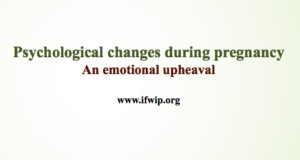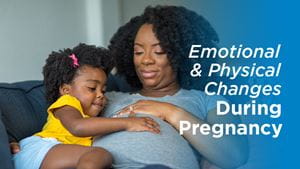Emotional changes in pregnancy are common due to hormonal fluctuations and physical changes. Expectant mothers may experience mood swings, anxiety, and heightened sensitivity.
Pregnancy is an exciting yet challenging journey filled with various emotional ups and downs. Hormonal changes significantly impact mood, often leading to feelings of joy, anxiety, and even sadness. Many women feel overwhelmed by the anticipation of motherhood and the physical changes occurring in their bodies.
These emotional shifts are natural and can be influenced by factors like stress and support systems. Understanding these feelings can help expectant mothers navigate their emotional landscape more effectively. Open communication with partners, friends, and healthcare providers can offer essential support during this transformative period, ensuring a healthier emotional experience throughout pregnancy.
Introduction To Emotional Changes During Pregnancy
Pregnancy is a transformative journey. Expectant mothers face many physical changes. Alongside these changes, emotional shifts also occur. Understanding these emotions is crucial for both mother and baby. This section explores the common feelings experienced during pregnancy.
Stay Connected with Google News
Common Feelings Expectant Mothers Experience
Expectant mothers often go through a range of emotions. Here are some common feelings:
- Joy: Excitement about the new arrival.
- Anxiety: Worries about the baby’s health and future.
- Frustration: Coping with physical changes and discomfort.
- Sadness: Feeling overwhelmed or blue at times.
- Love: A deepening bond with the baby.
- Confusion: Uncertainty about parenting and responsibilities.
These emotions can vary daily. It’s normal to feel a mix of them.
Why Emotional Health Is Vital In Pregnancy
Emotional health plays a significant role during pregnancy. Here are some reasons why:
- Supports Baby’s Development: Positive emotions can benefit fetal growth.
- Enhances Maternal Well-being: Healthy emotions lead to better self-care.
- Improves Relationships: Emotional health strengthens bonds with partners and family.
- Reduces Stress: Managing emotions lowers stress levels for both mother and baby.
- Encourages Seeking Help: Healthy emotional awareness prompts mothers to seek support.
Taking care of emotional health leads to a healthier pregnancy. Expectant mothers should prioritize their feelings.
Hormones And Mood Fluctuations
Pregnancy brings many changes to a woman’s body. Hormones play a big role in these changes. They affect emotions and mood. Understanding how hormones influence feelings is important. This section discusses the key hormones involved.
Role Of Estrogen And Progesterone
Estrogen and progesterone are two main hormones during pregnancy. They help the body adapt to pregnancy. These hormones can cause mood swings.
- Estrogen: Levels rise quickly in early pregnancy. It boosts mood and energy. However, it can also lead to irritability.
- Progesterone: Levels increase steadily. It promotes relaxation but can cause fatigue. This combination can create emotional ups and downs.
| Hormone | Effect on Mood | Emotional Impact |
|---|---|---|
| Estrogen | Increases mood and energy | Irritability possible |
| Progesterone | Promotes relaxation | Fatigue and mood swings |
Understanding The Stress Hormone: Cortisol
Cortisol is known as the stress hormone. Its levels can rise during pregnancy. This rise can affect emotional well-being.
- Cortisol helps manage stress.
- High levels can lead to anxiety.
- Pregnant women may feel overwhelmed easily.
Maintaining a healthy lifestyle can help regulate these hormones. Balanced nutrition, exercise, and relaxation techniques are useful. Managing stress is key for emotional health during pregnancy.
First Trimester Emotional Rollercoaster
The first trimester of pregnancy is a time of intense emotions. Expecting mothers often experience a mix of joy, fear, and uncertainty. The body undergoes many changes, which can lead to emotional ups and downs. Understanding these feelings can help ease the journey.
Excitement And Anxiety Of Early Pregnancy
Early pregnancy brings a whirlwind of excitement and anxiety. Many women feel thrilled about the new life growing inside them. Yet, worries often creep in. Here are common emotions faced during this time:
- Joy: Celebrating the news with loved ones.
- Fear: Concerns about health and development.
- Overwhelm: Adjusting to the changes in life.
- Hope: Dreaming about the future with the baby.
These emotions can fluctuate daily. It’s normal to feel happy one moment and anxious the next. Remember, it’s okay to express these feelings. Support from family and friends can be very helpful.
Coping With Fatigue And Morning Sickness
Fatigue and morning sickness are common in the first trimester. These symptoms can affect mood and emotional well-being. Here are some tips to cope:
- Rest as much as possible.
- Eat small, frequent meals to manage nausea.
- Stay hydrated to combat fatigue.
- Engage in light exercise, like walking.
- Practice relaxation techniques such as deep breathing.
Taking care of your body helps your mind. Prioritize self-care. This period can feel challenging, but it’s also a time of growth. Embrace the journey and seek support when needed.

Credit: parenting.firstcry.ae
Second Trimester Shifts
The second trimester often brings noticeable changes. Expect a shift in emotional well-being. Many women feel more stable and energetic during this time. It’s a crucial phase for both body and mind.
Stabilizing Moods And Energy Levels
During the second trimester, mood swings may begin to stabilize. Hormonal fluctuations start to balance out. As a result, many women experience:
- Increased energy levels
- Improved sleep patterns
- Better emotional resilience
This period allows women to enjoy their pregnancy more. Activities become easier to manage. Daily tasks feel less overwhelming.
Common emotional changes include:
| Emotional Change | Description |
|---|---|
| Reduced Anxiety | Less worry about pregnancy complications |
| Increased Happiness | More excitement about the baby |
| Enhanced Connection | Stronger bond with the partner |
Body Image And Self-esteem Concerns
Body image issues may arise during the second trimester. As the belly grows, women may feel self-conscious. Changing shapes can lead to mixed feelings.
Common concerns include:
- Weight gain
- Stretch marks
- Physical discomfort
It’s important to address these feelings. Open conversations with partners or friends can help. Finding support groups can also be beneficial.
Positive affirmations can boost self-esteem. Here are a few examples:
- I am beautiful, strong, and capable.
- My body is doing amazing things.
- I am ready to embrace motherhood.
Focusing on the joy of pregnancy can help ease concerns. Celebrate the journey and appreciate the changes.
Third Trimester Challenges
The third trimester of pregnancy brings unique emotional changes. Expectant mothers face a mix of excitement and anxiety. These feelings stem from anticipation of childbirth and upcoming life changes. Understanding these challenges can help manage emotions effectively.
Anticipatory Anxiety About Childbirth
As the due date approaches, many women experience anticipatory anxiety. This feeling often includes:
- Fear of pain during labor
- Concerns about delivery complications
- Worries about the baby’s health
- Doubts about personal capabilities as a mother
Strategies to cope with this anxiety include:
- Practicing relaxation techniques, such as deep breathing.
- Attending childbirth classes for preparation.
- Talking with healthcare providers about concerns.
- Connecting with other expectant mothers for support.
Preparing For Life Changes And Parenthood
The transition to parenthood brings significant emotional shifts. Expecting mothers may feel:
- Excitement about meeting the baby.
- Nervousness about new responsibilities.
- Overwhelm from preparing the home for the baby.
To ease this transition, consider these tips:
| Tip | Description |
|---|---|
| Create a birth plan | Outline preferences for labor and delivery. |
| Discuss parenting roles | Communicate with your partner about duties. |
| Prepare a nursery | Set up a comfortable space for the baby. |
| Stock up on essentials | Gather diapers, clothes, and feeding supplies. |
Emotional changes in the third trimester are normal. Staying informed and prepared helps manage these feelings.
The Impact Of External Stressors
Pregnancy brings many emotional changes. External stressors can heighten these feelings. Stressors include relationship issues, work demands, and financial worries. Understanding these factors is crucial for emotional health.
Navigating Relationship Dynamics
Pregnancy affects relationships. Partners may feel different emotions. Here are some common changes:
- Increased sensitivity: Hormonal shifts can heighten emotional responses.
- Communication challenges: Misunderstandings may arise easily.
- Support needs: Pregnant individuals often seek more support.
It’s essential to communicate openly. Express needs and feelings clearly. Consider these tips:
- Schedule regular check-ins with your partner.
- Practice active listening. Show that you care.
- Seek couples counseling if needed.
Dealing With Work And Financial Pressures
Work and financial stress can affect pregnancy. Many expectant parents face job demands and financial worries. These pressures can lead to anxiety. Here’s how they impact emotional well-being:
| Stress Factor | Emotional Impact |
|---|---|
| Job insecurity | Increased anxiety and fear |
| Long working hours | Feeling overwhelmed and tired |
| Financial strain | Heightened stress and worry |
Managing work and financial pressure is vital. Here are some effective strategies:
- Set clear work boundaries. Avoid overworking.
- Create a budget. Track expenses and savings.
- Talk to your employer about flexible hours.
Seek support from family and friends. They can help ease the burden.
Strategies For Managing Emotional Changes
Pregnancy brings many emotional ups and downs. Managing these changes is essential for well-being. Here are some effective strategies to help you cope.
Mindfulness And Relaxation Techniques
Mindfulness can help you stay grounded. It encourages living in the moment. Consider these techniques:
- Deep Breathing: Inhale deeply through your nose. Exhale slowly through your mouth.
- Meditation: Spend a few minutes each day focusing on your breath.
- Yoga: Gentle yoga can ease stress and improve mood.
- Visualization: Imagine a peaceful place to calm your mind.
These practices reduce anxiety. They promote a sense of calm. Try to integrate them into your daily routine.
The Importance Of Support Networks
A strong support network is vital. Friends and family can offer comfort and encouragement. Here’s how to build your network:
- Connect with other expectant mothers: Join local or online groups.
- Talk to your partner: Share your feelings and experiences.
- Seek professional help: Consider therapy if needed.
Support from loved ones makes a big difference. Regular communication helps you feel understood. Remember, you are not alone during this journey.
When To Seek Professional Help
Pregnancy brings many emotional changes. Some changes can feel overwhelming. Knowing when to seek help is vital for your well-being. Early intervention can make a significant difference.
Recognizing Signs Of Prenatal Depression
Understanding the signs of prenatal depression is crucial. Many women experience mood swings and anxiety. However, persistent feelings may indicate a problem. Here are some key signs:
- Feeling sad or hopeless most of the time.
- Loss of interest in activities you once enjoyed.
- Changes in sleep patterns, either too much or too little.
- Changes in appetite or weight.
- Difficulty concentrating or making decisions.
- Feeling overwhelmed or out of control.
- Thoughts of self-harm or harming the baby.
If you notice these signs, seek help. Prenatal depression affects both you and your baby. Early treatment can lead to better outcomes.
Therapy And Support Resources For Expectant Mothers
Finding the right support is essential. Many resources are available to help expectant mothers. Here are some options:
| Resource Type | Description |
|---|---|
| Therapists | Specialized in prenatal mental health. |
| Support Groups | Connect with other mothers facing similar challenges. |
| Hotlines | 24/7 support and guidance. |
| Online Communities | Forums for sharing experiences and advice. |
Consider reaching out to a therapist. They can offer coping strategies. Support groups provide shared experiences. Hotlines can be a lifeline during tough moments. Utilize these resources for your emotional health.

Credit: www.ifwip.org
Frequently Asked Questions
What Emotional Changes Occur During Pregnancy?
Pregnancy brings mood swings, anxiety, and heightened emotions due to hormonal fluctuations and physical changes.
How Can I Manage Pregnancy Mood Swings?
Practicing mindfulness, regular exercise, and maintaining open communication with your partner can help manage mood swings.
Is Anxiety Common In Pregnancy?
Yes, many pregnant individuals experience anxiety due to hormonal changes, body image concerns, and upcoming life changes.
Can Pregnancy Affect My Relationships?
Pregnancy can change dynamics in relationships, often leading to increased intimacy or stress based on emotional changes.
Why Do I Feel More Emotional During Pregnancy?
Hormonal changes, physical discomfort, and anticipation of parenthood contribute to heightened emotions during pregnancy.
Are Emotional Changes In Pregnancy Normal?
Yes, emotional fluctuations are a normal part of pregnancy, affecting many women to varying degrees.
Should I Seek Help For Pregnancy Emotions?
Consulting a healthcare professional is advisable if emotions become overwhelming or interfere with daily life.
How Long Do Emotional Changes Last In Pregnancy?
Emotional changes typically fluctuate throughout pregnancy and may continue postpartum, often improving over time.
Conclusion
Pregnancy brings significant emotional changes that can be both challenging and beautiful. Understanding these feelings is essential for expectant parents. Open communication with your partner and seeking support can ease this journey. Embracing these emotions fosters a stronger bond with your baby and helps prepare for the joys of parenthood.




